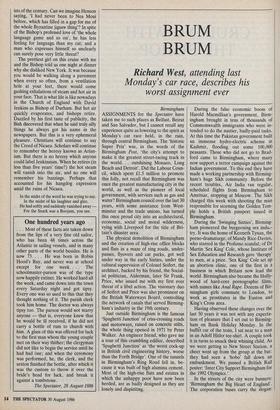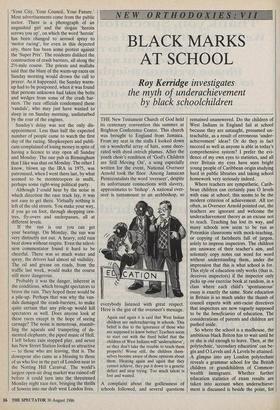BRUM BRUM
Richard West, attending last
Monday's car race, describes his worst assignment ever
Birmingham ASSIGNMENTS for the Spectator have taken me to such places as Belfast, Beirut and San Salvador, but I cannot recall any experience quite as lowering to the spirit as Monday's car race held, in the rain, through central Birmingham. The 'historic Super Prix' was, in the words of the Birmingham Post, 'the city's attempt to make it the greatest street-racing track in the world. . . outshining Monaco, Long Beach and Detroit'. Did the Labour Coun- cil, which spent £1.5 million to promote this folly, not recall that Birmingham was once the greatest manufacturing city in the world, as well as the pioneer of local government, with services such as gas and water? Birmingham council over the last 30 years, with some assistance from West- minster and the trade unions, has turned this once proud city into an architectural, economic, social and moral wilderness, vying with Liverpool for the title of Bri- tain's disaster area.
The physical demolition of Birmingham and the creation of high-rise office blocks and flats in a maze of ring roads, under- passes, flyovers and car parks, got well under way in the early Sixties, under the cultural supervision of Colonel Seifert, the architect, backed by his friend, the Social- ist politician, Alderman, later Sir Frank, Price, who issued me with my first ever threat of a libel action. The visionary duo of Seifert and Price was also prominent on the British Waterways Board, controlling the network of canals that served Birming- ham's industry in the 19th century.
Just outside Birmingham is the famous `Spaghetti Junction' of criss-crossing roads and motorways, raised on concrete stilts, the whole thing opened in 1971 by Peter Walker. An engineer friend, who gave me a tour of this crumbling edifice, described `Spaghetti Junction' as 'the worst cock-up in British civil engineering history, worse than the Forth Bridge'. One of the tunnels in Birmingham's Ring Road fell in, be- cause it was built of high alumina cement. Most of the high-rise flats and estates in which the unhappy poor have now been herded, are as badly designed as they are lonely and dispiriting. During the false economic boom of Harold Macmillian's government, Birm- ingham brought in tens of thousands of Commonwealth immigrants who were in- tended to do the nastier, badly-paid tasks. At this time the Pakistan government built an immense hydro-electric scheme in Kashmir, flooding out some 100,000 peasants. Those who did not go to Brad- ford came to Birmingham, where many now support a terror campaign against the Indian government. To this end they have made a working partnership with Birming- ham's huge Sikh community. Before the recent troubles, Air India ran regular, scheduled flights from Birmingham to Amritsar, stopping at Moscow. The Sikh charged this week with shooting the man responsible for storming the Golden Tem- ple holds a British passport issued in Birmingham.
During the 'Swinging Sixties', Birming- ham pioneered the burgeoning sex indu.,- try. It was the home of Kenneth Tynan, the porno-dramaturge; of Mandy Rice-Davies, who starred in the Profumo scandal; of Dr Martin 'Sex King' Cole, whose Institute of Sex Education and Research gave 'therapy' to men, at a price. 'Sex King' Cole set up an abortion clinic, one of the first in a business in which Britain now lead the world. Birmingham also became the Holly- wood of hard-core pornographic films, with names like Anal Rape. Dozens of Bir- mingham girls commute to London, to work as prostitutes in the Euston and King's Cross area.
Having observed these changes over the last 30 years it was not with any expecta- tion of pleasure that I set out to Birming- ham. on Bank Holiday Monday. In the buffet car of the train, I sat near to a man in an Adolf Hitler tee-shirt. A couple took it in turns to smack their whining child. As we were getting to New Street Station, a cheer went up from the group at the bar: they had seen a 'hobo' fall down an embankment. We passed a British Rail poster: 'Inter City Support Birmingham for the 1992 Olympics.'
In the streets of the city were banners: Birmingham the Big Heart of England'. The corporation buses carry the slogan: 'Your City, Your Council, Your Future.' Most advertisements come from the public sector. There is a photograph of an anguished girl and the slogan 'heroin screws you up', on which the word 'heroin' has been changed to aerosol spray to 'motor racing', for even in this dejected city, there has been some protest against the 'Super Prix'. The residents disliked the construction of crash barriers, all along the 21/2-mile course. The priests and mullahs said that the blare of the warm-up races on Sunday morning would drown the call to prayer. As it happened, the Sunday warm- up had to be postponed, when it was found that persons unknown had taken the bolts and wedges from some of the crash bar- riers. The race officials condemned these 'vandals', who may just have wanted to sleep in on Sunday morning, undisturbed by the roar of the engines.
Sunday's delay was not the only dis- appointment. Less than half the expected number of people came to watch the first day of the racing. Shopkeepers and publi- cans complained of losing money in spite of having a licence to stay open all Sunday and Monday. The one pub in Birmingham that I like was shut on Monday. The other I know, blown up the IRA in 1975, was patronised, when I went there last, by what seemed to be stormtroopers in mufti, perhaps some right-wing political party.
Although I' could hear by the noise in which direction the race track lay, it was not easy to get there. Virtually nothing is left of the old streets. You make your way, if you go on foot, through shopping cen- tres, fly-overs and underpasses, all at different levels.
If the sun is out you can get your bearings. On Monday, the sun was very distinctly not out. A heavy, cold rain beat down without respite. Even the televi- sion commentator found it hard to be cheerful. There was so much water and spray, the drivers had almost nil visibility. The oil and grease on roads, from the traffic last week, would make the course still more dangerous.
Probably it was the danger, inherent in the conditions, which brought spectators to brave the rain. They hoped there would be a pile-up. Perhaps that was why the van- dals damaged the crash-barriers, to make quite certain that any pile-up would kill spectators as well. Does anyone look at these races except in the hope of seeing carnage? The noise is monstrous, resemb- ling the squeals and trumpeting of de- mented elephants; the piped music of Hell. I left before rain stopped play, and never has New Street Station looked so attractive — to those who are leaving, that is. The downpour also came as a blessing to those of us who live in the part of London near to the Notting Hill Carnival. The world's largest open-air drug market was rained off before it could turn into the threatened Monday night race riot, bringing the thrills of Soweto into our drab west London lives.









































 Previous page
Previous page